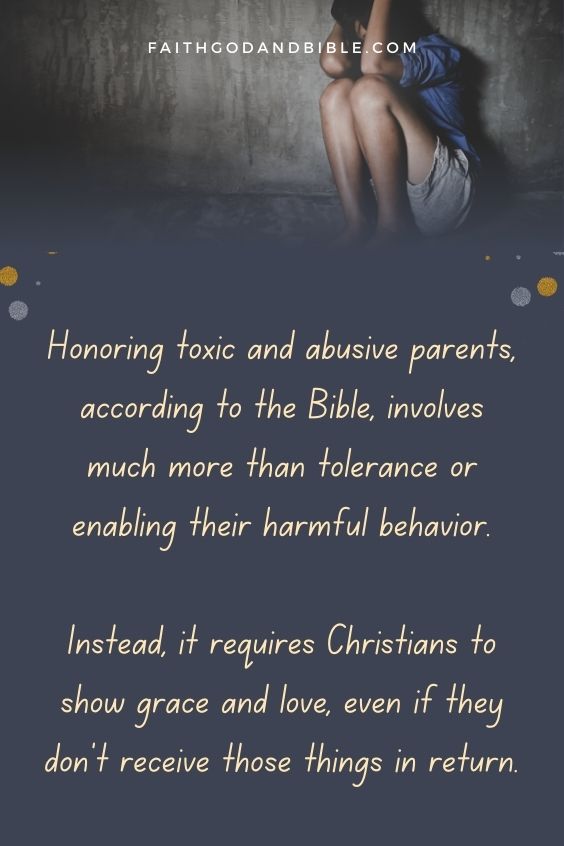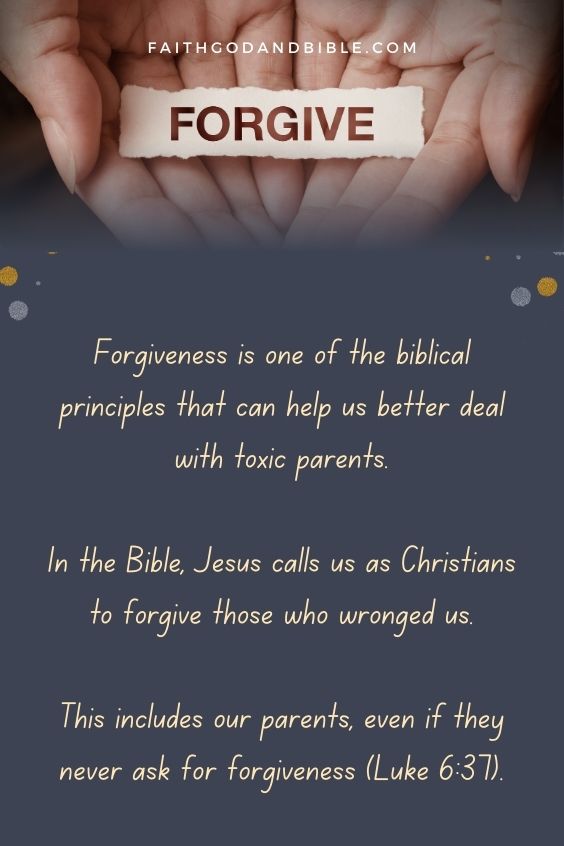It’s no secret that honoring toxic parents can be a difficult and uncomfortable task. Even though we are facing criticism, verbal abuse, or even physical mistreatment from the people who are supposed to love us most, the Bible clearly instructs us to “Honor your father and mother” (Exodus 20:12). Yet, how do we obediently honor them when it often feels impossible? In this blog post, we’ll explore ways of honoring toxic parents in ways that please our Heavenly Father, based on relevant biblical passages.
With my personal experience as a pastor with over 27 years of helping individuals acquire an intimate relationship with Jesus Christ and specializing in marital counseling, I will present various avenues for recognizing thousands-of-years-old Bible verses while implementing practical steps of loving safe rather than causing harm.

How Do You Biblically Honor Toxic Parents?
Understanding Honor in the Bible

How Do You Biblically Honor Toxic Parents?
God commands His people to honor their father and mother in the Bible, most notably in the Ten Commandments found in Exodus 20. At its core, honoring parents involves respect; that’s not only respect for their authority but also compassion and understanding. The Bible teaches us we are supposed to show love toward all people – no matter their sins or mistakes – so even though honoring toxic parents can be difficult at times, it is an essential commandment of God’s Word.

How Do You Biblically Honor Toxic Parents?
We need to think beyond our feelings and instead consider how following God’s will should drive our behavior. In Mark 12:30-31, Jesus instructs His followers: “Love the Lord your God with all your heart and with all your soul and with all your mind and with all your strength. Love others as you love yourself.” Loving ourselves often means setting boundaries; similarly, honoring toxic parents shows extended grace while still respecting the personal safety limits necessary for emotional health.
When we pour out compassion through prayerful faithfulness toward ill-tempered family members or those who have hurt us emotionally or spiritually over a long time, a healing process can begin that opens up new relational possibilities between the parties involved in this fraught dynamic.
How to Honor Toxic Parents in a Biblical Way

How Do You Biblically Honor Toxic Parents?
Biblically honoring our parents entails more than mere obedience; it requires us, as their children, to recognize and accept them for who they are—flawed human beings. By understanding the grace of God that we received through His love and mercy, we can then strive to extend this same courtesy in how we interact with our toxic parents.
Accepting their humanity
Every person, regardless of their perceived faults or mistakes, is a creation of God and thus deserves respect, and this includes toxic parents. One way to honor them in a biblical way is by accepting their basic humanity as flawed people who are often more than the sum of all their wrongs.

How Do You Biblically Honor Toxic Parents?
This does not mean that one should condone abusive behavior or tolerate mistreatment, but there can be an understanding that no human being is perfect on Earth and that everyone has shortcomings they must grapple with during their life’s journey.
As stated in John 8:7, “He who is without sin among you, let him throw a stone at her first” reinforcing the idea that no one can truly judge another for his or her sins until he/she has been judged himself/herself. This applies even to tormentors deemed toxic by those hurt by them.
Being the change
Honoring toxic and abusive parents, according to the Bible, involves much more than tolerance or enabling their harmful behavior. Instead, it requires Christians to show grace and love, even if they don’t receive those things in return.

How Do You Biblically Honor Toxic Parents?
Romans 12:14 states, “Bless those who persecute you; bless and do not curse them.” We are called by Christ to be the change, starting with self-love, which then flows through a healthy boundary and allows us to lay down our need for acceptance from our parents or even recognition of our own accomplishments.
Only when we honor ourselves first can we practice unconditional love toward others as taught by Christ’s commands (John 13:34). Instead of wishing away past events or memories that have caused pain, we open a possibility for forgiveness while still maintaining boundaries needed for safety—both physically and emotionally.
Forgiving toxic parents is difficult but can lead to personal healing, thus freeing us from carrying around excess baggage such as resentment and codependency (Matthew 6:14-15). One way to begin this journey is through Scripture study combined with prayer, in which the Holy Spirit leads individuals on how they should show respect despite all odds (1 Thessalonians 5:18).
Praying for them
When faced with toxic parents, it can be difficult to find ways to honor them according to biblical teachings. An important step in addressing this tension is prayer, and not just asking for their well-being. Praying for toxic parents means that, as a Christian believer, one calls upon Jesus as the source of strength and guidance when dealing with these difficult relationships. Prayer offers an opportunity to honor those we cannot necessarily love with one’s own strength.
At the same time, prayer recognizes that toxicity exists without enmeshing in the vortex created by it. Instead, prayer should focus on finding God’s grace and loving intentions. This act honors toxic parents’ humanity while also allowing believers to recognize the double bind they may be experiencing, without getting sucked into guilt trips about how “loveable” any one person is expected to be no matter what they have done wrong or hurtful.
Forgiving them
Forgiveness is one of the biblical principles that can help us better deal with toxic parents. In the Bible, Jesus calls us as Christians to forgive those who wronged us. This includes our parents, even if they never ask for forgiveness (Luke 6:37).

How Do You Biblically Honor Toxic Parents?
This commandment doesn’t require you to remain in an unhealthy relationship; it just acknowledges that we must find a way to heal and move on from hurt or anger without turning to bitterness and resentment.
To biblically honor our toxic parents, we must consciously choose forgiveness instead of allowing ourselves to be weighed down by unresolved emotions toward them. Moreover, when we exercise biblical-based forgiveness toward our toxic parent, Christ teaches us how powerful this act is in terms of personal transformation and spiritual growth (Matthew 18:21-35).
Replacing these feelings with compassion helps alleviate negative emotions such as hatred. More importantly, biblically-based forgiveness helps mend broken relationships between two parties by forming a bridge between them while, at the same time, serving as a reminder for both parties that God’s grace still has power over human flaws or mistakes made in life.
Loving from a safe distance
It is possible to honor toxic parents in a biblical way while still maintaining boundaries and distance for one’s own well-being. This can be done from afar by praying for them, forgiving them, and loving them with grace—all of which are taught throughout the Bible.
Establishing boundaries with abusive and neglectful parents isn’t contrary to honoring them; it’s in line with taking care of oneself as commanded by God (1 Peter 5:7). Families can even put forth communication guidelines that prioritize respect, such as avoiding criticism or name-calling when interacting. Additionally, disregarding tense conversations without escalating the situation sets an example of peaceable living as outlined in Romans 12:18. That example may eventually lead another toward reconciliation (Romans 14:19).
Often, unmet expectations lie beneath the tension between family members. Realigning those expectations provides healthier conditions under which to love from a safe distance. Nurturing positive relationships should bring healing instead of turmoil; if there is stress beyond what healthy limits will allow, then this approach must be reconsidered. Pray specifically over those situations, asking God for wisdom on rightfully maintaining a balance between honoring someone and holding firm against abuse or exploitation.
Conclusion
Honoring parents can be a difficult and even seemingly impossible task for some individuals, particularly when those parents are deemed “toxic.” However, the Bible does provide guidance on how to honor such parents while balancing compassion against protection. This means accepting their humanity without enabling or excusing their behavior, being the change by modeling grace and mercy as Jesus did, praying for them earnestly, forgiving them freely with an understanding of their own shortcomings and limitations, loving them from a safe distance while also creating boundaries so there is no harm done to either party, and seeking wise guidance from Jesus through regular, prayerful reflection of His words in the Scriptures.
With faith firmly fixed on Christ, honoring toxic parents according to biblical principles is possible if one goes into it cautiously yet confidently.
FAQs
1. What does the Bible say about honoring toxic parents?
The Bible provides both moral and practical instructions on how to honor your father and mother, even in situations where they may have done wrong or been physically abusive. The books of the Bible emphasize loving our neighbor as we love ourselves, forgiving past hurts, offering grace for transgressions, and praying for their protection under God’s care.
2. Is it possible to honor a toxic parent biblically without becoming codependent?
Yes. While it is important to offer compassion when dealing with a toxic parent who has hurt you in the past or is hurting you presently, biblical commandments also recognize that all relationships must be rooted in healthy boundaries set by mutual respect if they are to flourish long-term. This includes setting limits on contact frequency or suffering from compromises that violate personal values.
3. How can I maintain my relationship with my Savior despite conflicting demands from a toxic parent?
No one has control over another person’s spiritual walk, aside from Jesus Christ Himself. So, any advice offered up by family members should coincide with, but not replace, good Scriptural study and meditation on prayerful thoughts that are guided by faith in the Holy Spirit within us all.
Leave a comment